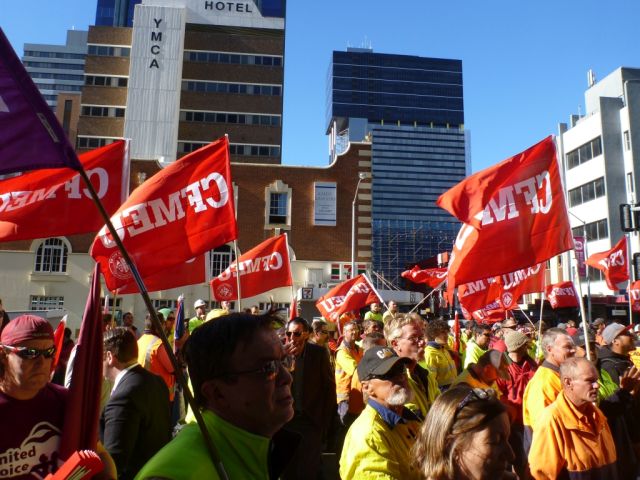
The witch-hunt into unions descended into farce last month as the Royal Commission’s attempt to justify its existence instead showed that it is an inquiry compromised by its politically motivated construction and damned by its own incompetence.
The week began with Australian Council of Trade Unions (ACTU) assistant secretary Tim Lyons attacking royal commissioner Dyson Heydon and senior counsel assisting Jeremy Stoljar for confusing workplace bargaining with corruption and failing to understand the role of unions they had been asked to investigate.
This followed a submission by one of the country’s largest employer organisations, Australian Industry Group, pointing out the difference between corporations and the not-for profit organisations governed by the Registered Organisations Act. There are far more registered employer organisations in Australia than unions. Just in case the commission had not yet read it, the submission included extracts from the International Labour Organisation’s 1948 Convention on Freedom of Association and Protection of the Right to Organise.
The submission pointed out: “Unlawful and inappropriate conduct within some unions must not be used as an excuse to impose unfair laws or an excessive compliance burden upon all registered organisations.” Which is to say that the commission’s choice to create a legal fiction by bringing unions under the Corporations Act would hurt employer organisations more than unions, as well as being unlikely to survive a legal challenge that it would be in breach of Australia’s international treaty obligations.
This is perhaps why Stoljar publicly released his final submissions to Heydon on October 31. But if they were intended to impress, they had the opposite effect.
His recommendation that two Australian Workers Union officials allegedly involved in a slush fund scam more than 20 years ago be referred to police ignored the fact that the matter has been the subject of a police inquiry since well before the Royal Commission was established.
His recommendation that the Health Services Union official who was to be his star witness, Kathy Jackson, face criminal prosecution is unlikely to happen any time soon. She is now involved in Federal Court proceedings taken by the HSU seeking to recover $1.4 million of union funds she is alleged to have improperly spent.
Stoljar could not find any charges that should be laid against Transport Workers Union official Tony Sheldon regarding a union fund established by union officials and used to bankroll political campaigns and union elections, including Sheldon’s campaign for ALP national president.
So he was reduced to observing that his conduct evinces a “culture of entitlement” among the fund directors. If it was their money in their fund, perhaps they were entitled to think it could be used by them for their benefit.
The only new recommendation of any substance was against the Victorian state secretary of the Construction Forestry Mining Energy Union (CFMEU), John Setka.
In what the CFMEU’s construction division national secretary Dave Noonan described as “unfortunate but predictable bias”, Stoljar said Setka had engaged in blackmail during an industrial dispute. He recommended that the Victorian government seek advice from the Director of Public Prosecutions on whether to prosecute him.
But Victorian Premier Denis Napthine has a better idea. He has written to the Royal Commission asking that the CFMEU be deregistered.
Napthine made this announcement when he and Prime Minister Tony Abbott held a press conference on October 31 to announce that a joint taskforce of the Australian Federal Police and the Victorian Police would be set up to investigate corruption and criminal behaviour in the building industry.
The NSW Police Force has also received a request from the royal commissioner to join the taskforce which will be under the commission’s direction.
However, as the ACTU’s Tim Lyons has pointed out, this is the second time that the taskforce has been announced. In January, the CFMEU’s national executive wrote to the NSW and Victorian police commissioners indicating the union’s willingness to help the police with uncovering corruption.
After this, the federal attorney-general’s department announced the taskforce in February — eight months ago. Any connection with the reannouncement and the Victorian state election in four weeks’ time is, of course, purely coincidental.
This political stunt is matched only by the extraordinary fact that the taskforce is set up to report to the Royal Commission. If any criminal behaviour is found by the taskforce, it should proceed to prosecution immediately. What possible purpose, other than political, is served by having any reports that might emanate from its investigations being mediated by an external commission of demonstrated mediocrity?
The federal government is pressing ahead with changes to the Fair Work Act that are designed to make it more difficult than it already is for unions to reach agreements on wages and working conditions for their members.
Employment minister Eric Abetz has announced that amendments to the act will be introduced into parliament next month. These will require the Fair Work Commission to be satisfied that union claims are not “manifestly excessive”, are “fair and reasonable” and would not have “a significant adverse impact” on productivity, before unions can hold a ballot for industrial action. The present requirement is that the commission be satisfied that bargaining representatives are genuinely trying to reach agreement.
Abetz explained that the changes were designed to curb enterprise agreements that delivered pay rises in excess of inflation without productivity offsets. The two unions he nominated that were in breach of these non-existent rules were the Maritime Union of Australia and the CFMEU.
Again, of course, it is entirely coincidental that these two militant unions have been prominent among the unions targeted by the Royal Commission.
Like the article? Subscribe to Green Left now! You can also like us on Facebook and follow us on Twitter.